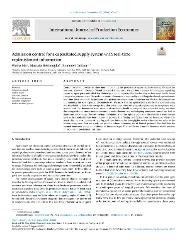| dc.contributor.author | Ma, Weina | |
| dc.contributor.author | Hekimoglu, Mustafa | |
| dc.contributor.author | Dekker, Rommert | |
| dc.date.accessioned | 2023-10-19T15:11:38Z | |
| dc.date.available | 2023-10-19T15:11:38Z | |
| dc.date.issued | 2023 | |
| dc.identifier.issn | 0925-5273 | |
| dc.identifier.issn | 1873-7579 | |
| dc.identifier.uri | https://doi.org/10.1016/j.ijpe.2023.109000 | |
| dc.identifier.uri | https://hdl.handle.net/20.500.12469/5142 | |
| dc.description.abstract | Control towers can provide real-time information on logistic processes to support decision making. The question however, is how to make use of it and how much it may save. We consider this issue for a company supplying expensive spare parts and which has limited production capacity. Besides deciding on base stock levels, it can accept or reject customers. The real-time status information is captured by a k-Erlang distributed replenishment lead time. First we model the problem with patient customers as an infinite-horizon Markov decision process and minimize the total expected discounted cost. We prove that the optimal policy can be characterized using two thresholds: a base work storage level that determines when ordering takes place and an acceptance work storage level that determines when demand of customers should be accepted. In a numerical study, we show that using real-time status information on the replenishment item and adopting admission control can lead to significant cost savings. The cost savings are highest when the optimal admission threshold is a work storage level with a replenishment item halfway in process. This finding is different from the literature, where it is stated that the cost increase of ignoring real-time information is negligible under either the lost sales or the backordering case. Next we study the problem where customers are of limited patience. We find that the optimal admission policy is not always of threshold type. This is different from the literature which assumes an exponential production lead time. | en_US |
| dc.description.sponsorship | Netherlands Research Council (NWO) [438-15-620]; Dutch Institute for Advanced Logistics (TKI-Dinalog) | en_US |
| dc.description.sponsorship | This work is a part of the project on Proactive Service Logistics for Advanced Capital Goods Next (ProSeloNext, Project number 438-15-620) , which is supported by Netherlands Research Council (NWO) and the Dutch Institute for Advanced Logistics (TKI-Dinalog) . We would like to thank Chiel van Oosterom for assistance in the model formulation and analysis. We finally thank the referees for useful comments. | en_US |
| dc.language.iso | eng | en_US |
| dc.publisher | Elsevier | en_US |
| dc.relation.ispartof | International Journal of Production Economics | en_US |
| dc.rights | info:eu-repo/semantics/openAccess | en_US |
| dc.subject | Production-Inventory System | En_Us |
| dc.subject | 2 Demand Classes | En_Us |
| dc.subject | Queue | En_Us |
| dc.subject | Cost | En_Us |
| dc.subject | Admission control | en_US |
| dc.subject | Control tower | en_US |
| dc.subject | Inventory systems | en_US |
| dc.subject | Make-to-stock queues | en_US |
| dc.subject | Customer impatience | en_US |
| dc.subject | Markov decision process | en_US |
| dc.title | Admission control for a capacitated supply system with real-time replenishment information | en_US |
| dc.type | article | en_US |
| dc.identifier.volume | 266 | en_US |
| dc.department | N/A | en_US |
| dc.identifier.wos | WOS:001073801700001 | en_US |
| dc.identifier.doi | 10.1016/j.ijpe.2023.109000 | en_US |
| dc.identifier.scopus | 2-s2.0-85169926533 | en_US |
| dc.institutionauthor | N/A | |
| dc.relation.publicationcategory | Makale - Uluslararası Hakemli Dergi - Kurum Öğretim Elemanı | en_US |
| dc.khas | 20231019-WoS | en_US |
















